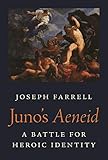Juno's Aeneid : A Battle for Heroic Identity / Joseph Farrell.
Material type: TextSeries: Martin Classical Lectures ; 1Publisher: Princeton, NJ : Princeton University Press, [2021]Copyright date: ©2021Description: 1 online resource (384 p.)Content type:
TextSeries: Martin Classical Lectures ; 1Publisher: Princeton, NJ : Princeton University Press, [2021]Copyright date: ©2021Description: 1 online resource (384 p.)Content type: - 9780691211176
- Epic poetry, Latin -- History and criticism
- Homer-Influence
- LITERARY CRITICISM / Ancient & Classical
- Agamemnon
- Apollonius
- Callimachus
- Greek art
- Greek heroes
- Greek literature
- Homeric Greek
- Ilium
- Latin literature
- Penelope
- Publius Vergilius Maro
- Roman art
- Roman history
- Roman literature
- Telemachus
- Trojan War
- Troy
- Virgil
- classics
- comedy
- dissent
- epic cycle
- epic poetry
- ethical philosophy
- intertextuality
- kingship theory
- metapoetics
- opposition
- politics
- tragedy and comedy
- tragedy
- 873/.01 23
- PA6825
- PA6825
- online - DeGruyter
| Item type | Current library | Call number | URL | Status | Notes | Barcode | |
|---|---|---|---|---|---|---|---|
 eBook
eBook
|
Biblioteca "Angelicum" Pont. Univ. S.Tommaso d'Aquino Nuvola online | online - DeGruyter (Browse shelf(Opens below)) | Online access | Not for loan (Accesso limitato) | Accesso per gli utenti autorizzati / Access for authorized users | (dgr)9780691211176 |
Frontmatter -- Contents -- Acknowledgments -- A Note to the Reader -- Introduction -- 1. Arms and a Man -- 2. Third Ways -- 3. Reading Aeneas -- Appendix: mene in-and mênin -- Works Cited -- Index of Passages Cited -- General Index -- A NOTE ON THE TYPE
restricted access online access with authorization star
http://purl.org/coar/access_right/c_16ec
A major new interpretation of Vergil's epic poem as a struggle between two incompatible versions of the Homeric heroThis compelling book offers an entirely new way of understanding the Aeneid. Many scholars regard Vergil's poem as an attempt to combine Homer’s Iliad and Odyssey into a single epic. Joseph Farrell challenges this view, revealing how the Aeneid stages an epic contest to determine which kind of story it will tell—and what kind of hero Aeneas will be.Farrell shows how this contest is provoked by the transgressive goddess Juno, who challenges Vergil for the soul of his hero and poem. Her goal is to transform the poem into an Iliad of continuous Trojan persecution instead of an Odyssey of successful homecoming. Farrell discusses how ancient critics considered the flexible Odysseus the model of a good leader but censured the hero of the Iliad, the intransigent Achilles, as a bad one. He describes how the battle over which kind of leader Aeneas will prove to be continues throughout the poem, and explores how this struggle reflects in very different ways on the ethical legitimacy of Rome’s emperor, Caesar Augustus.By reframing the Aeneid in this way, Farrell demonstrates how the purpose of the poem is to confront the reader with an urgent decision between incompatible possibilities and provoke uncertainty about whether the poem is a celebration of Augustus or a melancholy reflection on the discontents of a troubled age.
Mode of access: Internet via World Wide Web.
In English.
Description based on online resource; title from PDF title page (publisher's Web site, viewed 01. Dez 2022)


